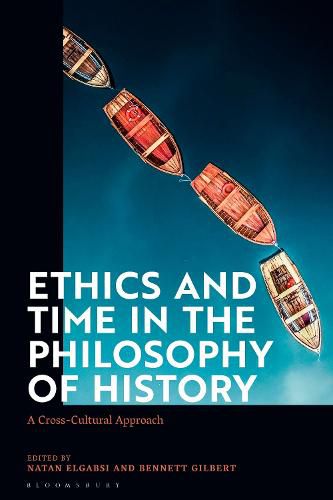Readings Newsletter
Become a Readings Member to make your shopping experience even easier.
Sign in or sign up for free!
You’re not far away from qualifying for FREE standard shipping within Australia
You’ve qualified for FREE standard shipping within Australia
The cart is loading…






This interdisciplinary volume connects the philosophy of history to moral philosophy with a unique focus on time. Taking in a range of intellectual traditions, cultural, and geographical contexts, the volume provides a rich tapestry of approaches to time, morality, culture, and history.
By extending the philosophical discussion on the ethical importance of temporality, the editors disentangle some of the disciplinary tensions between analytical and hermeneutic philosophy of history, cultural theory, meta-ethical theory, and normative ethics. The ethical and existential character of temporality reveals itself within a collection that resists the methodological underpinnings of any one philosophical school. The book’s distinctive cross-cultural approach ensures a wide range of perspectives with contributions on life and death in Japanese philosophy, ethics and time in Maori philosophy, non-traditional temporalities and philosophical anthropology, as well as global approaches to ethics.
These new directions of study highlight the importance of the ethical in the temporal, inviting further points of departure in this burgeoning field.
$9.00 standard shipping within Australia
FREE standard shipping within Australia for orders over $100.00
Express & International shipping calculated at checkout
This interdisciplinary volume connects the philosophy of history to moral philosophy with a unique focus on time. Taking in a range of intellectual traditions, cultural, and geographical contexts, the volume provides a rich tapestry of approaches to time, morality, culture, and history.
By extending the philosophical discussion on the ethical importance of temporality, the editors disentangle some of the disciplinary tensions between analytical and hermeneutic philosophy of history, cultural theory, meta-ethical theory, and normative ethics. The ethical and existential character of temporality reveals itself within a collection that resists the methodological underpinnings of any one philosophical school. The book’s distinctive cross-cultural approach ensures a wide range of perspectives with contributions on life and death in Japanese philosophy, ethics and time in Maori philosophy, non-traditional temporalities and philosophical anthropology, as well as global approaches to ethics.
These new directions of study highlight the importance of the ethical in the temporal, inviting further points of departure in this burgeoning field.